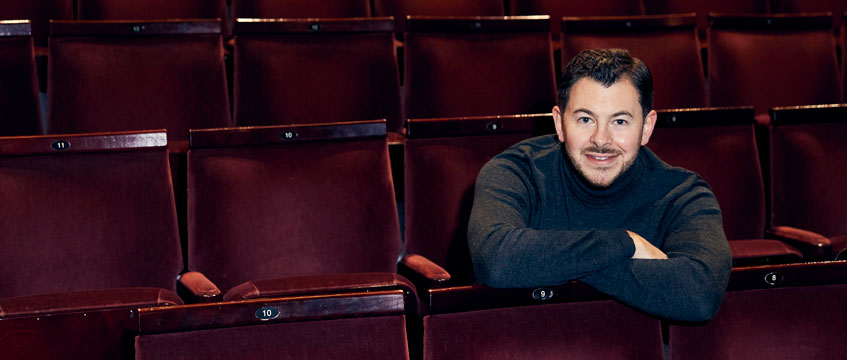How the world’s largest theatre owner kept the show on the road
James Bradshaw is not accustomed to being centre stage. In fact, the Ambassador Theatre Group’s new property director hasn’t set foot on one since school – unless it was to inspect it for dilapidations.
“I used to act a bit at school,” he says, a little sheepishly. “I was Dandy Dan in Bugsy Malone. And I was The Wizz in The Wizz. I had three solos!”
Sadly, he isn’t tempted to belt out a show tune as he stands on the stage of the Duke of York’s, in London’s Theatreland.
James Bradshaw is not accustomed to being centre stage. In fact, the Ambassador Theatre Group’s new property director hasn’t set foot on one since school – unless it was to inspect it for dilapidations.
“I used to act a bit at school,” he says, a little sheepishly. “I was Dandy Dan in Bugsy Malone. And I was The Wizz in The Wizz. I had three solos!”
Sadly, he isn’t tempted to belt out a show tune as he stands on the stage of the Duke of York’s, in London’s Theatreland.
The theatre is one of ATG’s 11 West End venues – in fact, it was the first the group bought, back in 1992. Although the building is 130 years old, the stage is brand new. Bradshaw’s team took the entire thing up and replaced it when the theatres went dark during the pandemic. Not that it stayed pristine for long. The National Theatre’s Ocean at the End of the Lane is in residence now, and has cut 26 traps into the new wood. “It’s dilapidations, the same with a traditional property, but with a bit more rigour,” Bradshaw says, because the “tenant” is always knocking the building about. That and the fact the average length of a “tenancy” is 13 weeks.
It is easy to forget that ATG’s true business is real estate. “That often gets overlooked,” says the man who has been responsible for its near 2m sq ft portfolio since July. “But if I’ve got a producer coming in, then I need to make sure the building is perfect. And then I have to provide front-of-house hospitality, MEP [mechanical, electrical and plumbing], ticketing, skilled labour. A producer could be leasing space for anything from one day to, well, something like The Mousetrap, which is in its 70th year.”
So a theatre is like a flexible office? But with more expensive drinks? “With that kind of flexibility of tenure, collaboration – it’s space as a service,” Bradshaw says with a grin.
Take that, Antony Slumbers! He doubles down. “Theatres have been doing space as a service for about 200 years!”
World tour
The idea of a property director is a relatively new concept in the theatre world. There are plenty of directors, but if you ask who is in charge of the “properties”, someone will most likely point to an assistant stage manager.
ATG’s portfolio ranges in age from the brand new to sites built during the Napoleonic wars. But many of the issues are the same. “It’s replacing corroded steelwork, replacing the roofs. Upgrading the MEP infrastructure throughout the buildings is a big one.” That’s an understatement. ATG has just spent £3m doing exactly that at the Apollo Victoria. Across the portfolio that is hundreds of millions. “I talk about MEP so much my friends think I work in air conditioning,” jokes Bradshaw.
And then there are endless smaller projects. For those, Bradshaw’s team works around the productions, sneaking in to replace seats one row at a time before the matinee begins. “Working around that is a bit like building a ship in a bottle while doing a Rubik’s Cube,” he says, “but it’s fun.”
His office is on Shaftesbury Avenue, “right in the heart of Theatreland”. In fact, it is within a thrown bouquet’s distance of three of ATG’s West End theatres – the Phoenix, the Palace and its namesake, the Ambassadors.
Not that Bradshaw’s work is confined to the West End. The week before we meet, he was visiting ATG’s three Scottish venues. When we catch up a week later, he is trudging the streets of Bristol, heading to the Hippodrome. “It’s not one I’ve been to before,” he says. “I’m frantically trying to tick off as many as I can.” He hopes to be done by April, which is no mean feat, considering the 32-string portfolio stretches from Glasgow to Torquay. And once all the UK venues have been checked off, there are the 26 venues in Germany and the US, where the company bought three new venues during lockdown and where Bradshaw expects “a lot of our expansion” to now take place.
In fact, ATG is comfortably the largest theatre owner in the world. In total, more than 9m people come to its 58 venues every year to watch more than 12,000 shows. Rivals such as Nimax or Cameron Mackintosh tend to be focused solely on the West End. ATG’s closest competition is probably a business like Bradshaw’s former employer AEG, with its global spread of concert halls, clubs and conference centres.
The audition
Bradshaw’s start in property was not the most auspicious. After school he studied at Kingston, graduating in the depths of the credit crunch with a 2.2 and no clear path he could see into the real estate industry. But after two years of trying to get a foot in the door, Cluttons took a chance on him in 2011. “It was a very conditional chance,” he recalls: he was to be a trainee surveyor, not a graduate surveyor, and he was sent to the telecoms department.
But there he flourished. “I had so much exposure to deals and leases. Because it was all such low value, I was doing a deal a day.” Meanwhile, self-inflicted imposter syndrome drove him ever harder and further, devouring the pages of EG (and others) to learn anything he didn’t know. “Which was everything, at the start.”
After qualifying he moved to a development role with the City of London Corporation, helping to move the Museum of London, working on the concert hall that never happened and relocating the Billingsgate, Smithfield and New Spitalfields markets. And in 2015 he joined AEG. As part of the senior leadership team for the site he still refers to fondly as the Millennium Dome, he set to work building out its enormous scheme, from the trampoline park to the “largest cinema south of Birmingham”.
With that done, Bradshaw switched to the European portfolio, but then felt it was the right time to move on. “I realised that live entertainment was where I wanted to be. But there aren’t exactly a lot of big operators.” Bradshaw did a bit of consultancy work, but then the pandemic hit. Like the theatres and music venues he wanted to work on, he hunkered down until the lockdown was over.
The role at ATG was serendipitous. “It came around at exactly the time that I was looking for it and… it’s wonderful.” The scale of the projects may seem less exciting than the O2, “but the breadth of the portfolio is the bit that’s really exciting”. That and the fact that Bradshaw is now responsible for restoring “grand, art deco, old buildings”, a personal passion.
A sense of place
The fact these buildings are constantly in use poses challenges. The gap between one production moving out and another moving in is often as little as 24 hours. And then there is the opposite problem, when a show is so successful that it just runs and runs. “Wicked has been running at the Apollo Vic for 15 years,” says Bradshaw. “Which means you’ve got one dark day a week to come in and do a huge intervention. And that’s just impossible.” Shutting down the show, even for something as important as the air-con, would be disastrous.
“ATG made the best of the lockdown,” he says. “It wasn’t easy, revenues were stretched. But we were able to get in and do a huge amount of work while we were dark.”
Even though the theatres have now reopened, Covid-related cancellations have hit productions, putting more pressure on the industry. “The biggest risk is for someone in the cast to get ill. That’s what shut Moulin Rouge [at ATG’s Piccadilly Theatre] down for a week. For us to have to cancel a show at a venue is unacceptable.”
And now Omicron is adding new restrictions to large venues. But Bradshaw isn’t fazed. ATG has been recommending masks since the theatres reopened, conducting lateral flow tests at the door, and using enhanced cleaning.
Despite live theatre moving online during the pandemic, Bradshaw also has no concerns about the future of the physical venue. “It’s like ordering a takeaway from a Michelin-starred restaurant instead of dining in. It’s just not the same.”
Far from losing its appeal, Bradshaw says there is a growing demand for the bricks and mortar of theatre. Landlords, he notes, are now recognising theatres as vital for placemaking. A landlord such as Shaftesbury may be mainly F&B and retail, but the reason people are coming to those streets is that they have a ticket to a West End show. “The councils know the benefit of that, that’s why they are trying to revive their old theatres, to create a sense of place.”
Take a look at ATG’s two most recent projects. The Stockton Globe was once a leading music venue – The Beatles played there, on the same day that John F Kennedy was assassinated. By the 1980s it was a bingo hall but, by the 1990s, it was mothballed and semi-derelict. Now, after a major restoration programme by the council, ATG has been brought in as the tenant, with a full slate of shows booked in for next year.
Meanwhile, Swansea Arena will launch next March as the first UK stop on Royal Blood’s world tour.
And ATG wants more. “We are private equity-backed, we are quite aggressive with our expansion, and we’ve got big ambitions,” Bradshaw says (the company is controlled by US-based Providence Equity Partners). “If it’s in an area where we don’t have a reach, or if it is on a touring circuit, we will look at it.”
And ATG isn’t just eyeing existing theatres. The company is working with a number of developers on new-build projects. Think of Ballymore and the Royal Ballet, or Berkeley Homes with the Bridge Theatre at One Tower Bridge. While at AEG, Bradshaw was involved with the deal for the music venue at Yoo Capital’s Olympia scheme.
“They may be loss-leaders for developers a lot of the time, but it’s getting that footfall, it’s drawing people to an area,” he says. “So we are working more with developers. And that is a big part of our expansion plan.”
It’s a learning journey, Bradshaw says. And, as when he was at Cluttons, he is reading up on everything he doesn’t know. “Although, to be honest, I’m reading The Stage a bit more than EG at the moment.”
Life is a Cabaret, old chum…
Some projects can be truly transformational, even if the results only last a short time.
At ATG’s Playhouse, the new production of Cabaret – starring Jessie Buckley and Eddie Redmayne – has taken over the whole building. Instead of serried ranks of seating and actors on an apron stage, every bit of public space has been reconfigured to become the Kit Kat Club of Weimar Berlin. “We wanted to make the entire theatre part of the experience,” says Bradshaw. “From the minute you walk in you are inside the show. You walk straight into Berlin on New Year’s Eve.”
Creating that meant a lot of work to tight deadlines. “As soon as tickets went on sale we had a start date that was set in stone. By the end of it we were working 24 hours a day, with three shifts in the building.”
Bradshaw’s predecessor, Dave Andrews – now ATG’s group property development director – led that particular project. But part of the joy for Bradshaw was the collaborative approach. “Every department at ATG was involved in it. You would have meetings and there would be producers in yellow Dr Martins and shorts, sat next to a property director in a suit. And everything in between.”
And it is similar to projects Bradshaw has led before at the O2, notably Mamma Mia! The Party. For that, his team “took a lumpy, ugly nightclub” and transformed it into a raucous Greek taverna. They even made sure the temperature was at a constant 23°C , to make it feel even more like a party on a Greek island. “That was the sweet spot, because it was warm enough that you take your jacket off, but not so hot it was uncomfortable.”
There he goes, talking about the air conditioning again.
The transformation was so good that Abba’s Björn Ulvaeus, who wrote the musical, thanked him for delivering it. “There was a pause,” Bradshaw recalls, “and then he said: ‘and now you’re supposed to thank me… for the music’.”
ATG is keen to do more immersive theatre. “That sort of experimental thing is something we are really trying to involve ourselves in,” says Bradshaw.
But every day a theatre is closed for works is a day it loses money. “Knocking a theatre about to make it in the round for 16 weeks – you can’t do that every time,” he says. “But sometimes it really pays off.”
To send feedback, e-mail piers.wehner@eg.co.uk or tweet @PiersWehner or @EGPropertyNews
© Portraits by Tom Campbell











